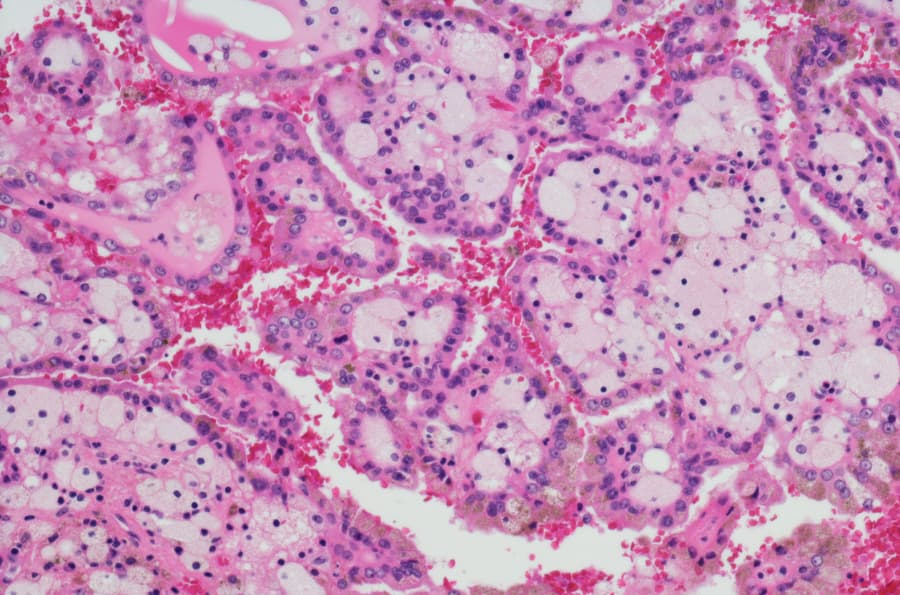Kidney (Renal) Cancer Experts in Connecticut, Maryland, and New Jersey
Kidney cancer, also known as renal cancer, is a disease that causes cancerous kidney cells to develop and grow out of control. It’s one of the most common cancers in men and women, but it is more prevalent among men.
Regional Cancer Care Associates, which serves patients throughout Connecticut, Maryland, and New Jersey, has diagnosed and treated many cases of kidney cancer. No matter a patient’s age or health history, our team will develop a personalized care plan to manage a cancer diagnosis and help patients lead a fulfilling life.
 Risk Factors and Causes
Risk Factors and Causes
In many cases, the cause of kidney cancer is unclear. However, certain risk factors are strongly linked to this disease, including:
- Smoking
- Obesity
- Being male
- Older age
- Exposure to cadmium, certain herbicides, and organic solvents like trichloroethylene
- A family history of kidney cancer
- Being born with von Hippel-Lindau disease, Birt-Hogg-Dubé syndrome, or familial papillary renal cell carcinoma
By moderating controllable risk factors such as smoking and obesity, and by undergoing regular kidney cancer screenings, high-risk individuals can protect themselves from this disease with help from their physicians.
Signs and Symptoms
Many patients with kidney cancer won’t see or feel symptoms until the tumor has grown larger, making screening imperative for high-risk individuals. As the tumor becomes larger, patients might experience one or more of the following signs and symptoms:
- Bloody urine
- Unexplained lower back pain on one side
- A lump on the side or lower back
- Unexplained fatigue
- Loss of appetite
- Unexplained weight loss
- Prolonged fever with no identifiable cause
- Anemia (low red blood cell count)
Upon spreading to another part of a patient’s body, or metastasizing, kidney cancer can even cause symptoms like shortness of breath, coughing up blood, and bone pain. If you or a loved one experiences any of these symptoms, contact your care provider right away.
If you present with symptoms of kidney cancer, your doctor may screen you for the disease by using one or more of the following methods:
- Computed tomography (CT)
- Magnetic resonance imaging (MRI)
- Ultrasound
- X-rays
- Bone scans
- Positron emission tomography (PET)
- Intravenous (IV) pyelogram
- Angiography
- Biopsy
- Blood tests, urine analysis, and staging
Types of Kidney Cancer
There are many different types of kidney cancer, the most common of which is renal cell carcinoma (RCC). RCCs form in the parts of the kidney that produce urine and collectively make up approximately nine in 10 cases of kidney cancer. Urothelial carcinomas, sarcomas, Wilms tumors, and lymphomas are other forms of kidney cancer.
RCC can be broken down into more specific subtypes. The most common subtype is clear cell RCC, which affects seven in 10 people with RCC. When viewed beneath a microscope, these cells can be identified by their pale or clear coloring. After identifying a patient’s RCC subtype, the doctor can determine whether the patient inherited the cancer and can use that genetic information to develop an effective treatment plan.
Stages of Kidney Cancer
Like many diseases, kidney cancer is classified in stages based on its extent, tumor size, and spread. Staging allows oncologists to categorize cancers to support treatment and understand rates of survival.
Kidney cancer is ranked from stages I through IV using the TNM system developed by the American Joint Committee on Cancer (AJCC). This system adds further insight to each stage, with numeric values for tumors, nodes, and spread (metastasis). Additional information from prognostic systems helps determine potential outcomes and treatment plans.
Treatment Options
At RCCA, we know that no two cancer diagnoses are alike. For this reason, our network of physicians targets each patient’s individual needs when developing kidney cancer treatments. Accounting for patients’ overall health, test results, and more, RCCA physicians develop care plans that may include:
- Chemotherapy
- Immunotherapy
- Targeted therapy
- Radiation therapy
- Clinical trials
- Genetic testing
- Palliative care
- Integrative care
- Complete mind and body support (e.g. nutritional counseling, yoga, etc.)
With 25 locations across Connecticut, Maryland, and New Jersey, RCCA is equipped to help people beat renal cancer and maintain their quality of life. If you or a loved one has or suspects kidney cancer, schedule an evaluation at a location near you.
